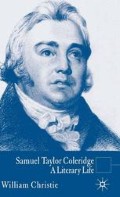Abstract
When he put The Watchman to rest and was planning his retirement from active politics in May 1796, Coleridge wrote to Poole that he was considering the options of preaching and teaching and private tutoring as sources of income for himself and the now alarmingly large group of his dependants: a pregnant Sara, her mother, her brother George, and her recently widowed sister Mary and Mary’s child (Robert Lovell having died of fever) (CL I, 192). It is always difficult to gauge just how seriously Coleridge is weighing vocational options when he is writing to a wealthier friend in a position to alleviate his financial burdens. The next two years would find Coleridge in a state of constant if not always acute anxiety about how to bring what he called ‘BREAD & CHEESE’ into the family on a regular basis, and therefore would also see a number of similarly oblique cries for help (CL I, 222, 227). I say the next two years, because the Wedgwood annuity that would be bestowed upon him in January 1798 seemed at the time to answer this anxiety. The truth is, however, it was an anxiety that would afflict him on and off for the remainder of his life. On this occasion, Poole revealed that he and other friends and well-wishers of Coleridge had clubbed together to find Coleridge £35–40, with the promise of future installments – a ‘trifling mark of their esteem, gratitude, and admiration’ for the ‘extraordinary marks of sublime genius’ he displayed.1 Again and again, Coleridge will be rescued by generous gifts of this kind, investments in Coleridge’s future productivity largely, but also, as Poole makes plain, acts of ‘gratitude’ for the sheer pleasure of having listened to him talk.
Access this chapter
Tax calculation will be finalised at checkout
Purchases are for personal use only
Preview
Unable to display preview. Download preview PDF.
Notes
Alvin Kernan, Printing Technology, Letters and Samuel Johnson (Princeton, NJ: Princeton University Press, 1987), p. 105.
In a review of ‘Boswell’s Life of Johnson’, first published in Fraser’s Magazine in 1832, reprinted in Thomas Carlyle, Critical and Miscellaneous Essays, in 5 vols (London: Chapman and Hall, 1899), III, 62–135 (p. 102).
In a letter to Bennet Langton, quoted in James Boswell, Life of Johnson, ed. R. W. Chapman, rev. J. D. Fleeman, The World’s Classics (Oxford: Oxford University Press, 1980), p. 231.
See Stephen Gill, William Wordsworth: A Life (Oxford: Clarendon, 1989), p. 296.
See, for example, Paul Korshin, ‘Types of Eighteenth-Century Literary Patronage’, Eighteenth-Century Studies, VII (1973–4), pp. 453–73,
and Dustin Griffin, Literary Patronage in England, 1650–1800 (Cambridge: Cambridge University Press, 1996).
Nigel Cross, The Common Writer: Life in Nineteenth-Century Grub Street (Cambridge: Cambridge University Press, 1985), pp. 14, 13, 25–6, 20.
As quoted in David Gardiner Williams, The Royal Society of Literature and the Patronage of George IV [doctoral dissertation submitted to Harvard University], in 2 vols (New York and London: Garland, 1987), 1, 15, 45.
For a study of changes in the conception of poetry and of the poet during the course of the eighteenth century, see M. H. Abrams, The Mirror and the Lamp: Romantic Theory and the Critical Tradition (London, Oxford, New York: Oxford University Press, 1953).
The epithet ‘governessy’ is from Humphry House, Coleridge, The Clark Lectures 1951–2 (London: Rupert Hart-Davis, 1953), p. 77.
Dorothy Wordsworth to Mary Hutchinson, June 1797, Wordsworth Letters: The Early Years, pp. 188–9.
Copyright information
© 2007 William Christie
About this chapter
Cite this chapter
Christie, W. (2007). ‘A Known and Familiar Landscape’: Conversations. In: Samuel Taylor Coleridge. Literary Lives. Palgrave Macmillan, London. https://doi.org/10.1057/9780230627857_4
Download citation
DOI: https://doi.org/10.1057/9780230627857_4
Publisher Name: Palgrave Macmillan, London
Print ISBN: 978-0-230-58096-1
Online ISBN: 978-0-230-62785-7
eBook Packages: Palgrave Literature & Performing Arts CollectionLiterature, Cultural and Media Studies (R0)

